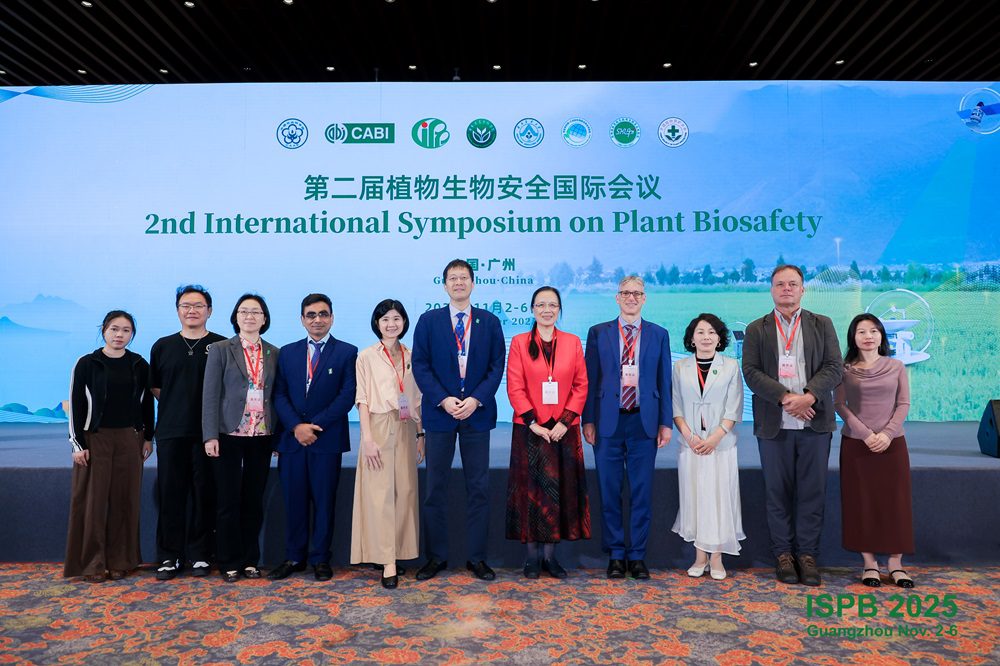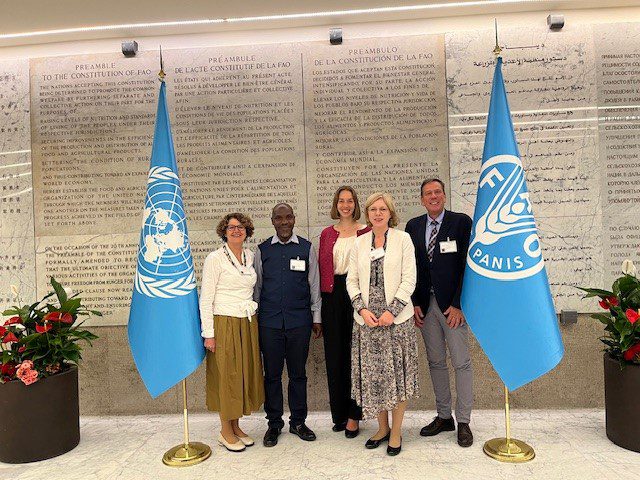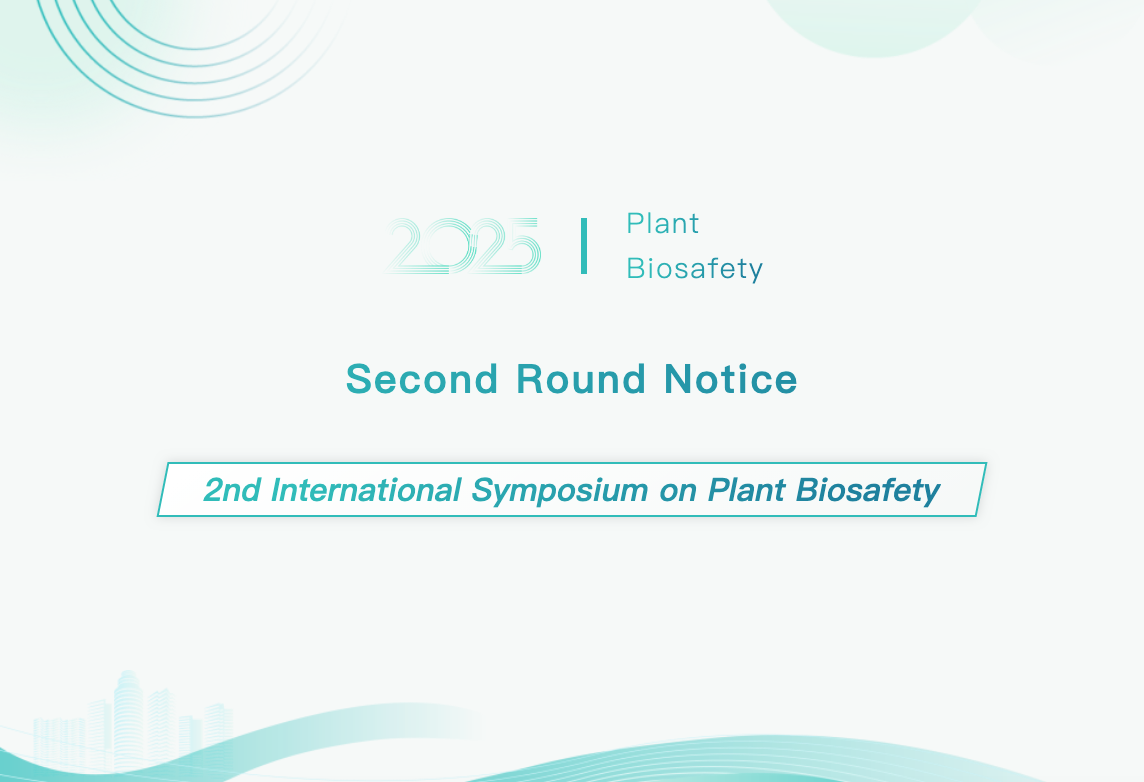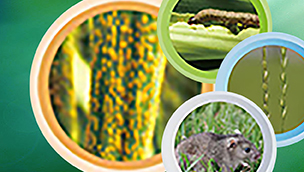International Symposium on Plant Biosafety (ISPB 2025) Convenes in Guangzhou —
Science-led plant health governance to secure food systems and advance the SDGs
LEARN MORE
Guangzhou, 2-6 November 2025 — The 2nd ISPB Symposium gathered more than 250 experts from 18 countries to confront one of the most persistent threats to global food systems: transboundary plant pests and diseases. Co-hosted by the Chinese Academy of Agricultural Sciences (CAAS) and CAB International (CABI), and co-organized by the Institute of Plant Protection, CAAS (IPPCAAS), Guangdong Academy of Agricultural Sciences (GDAAS) and South China Agricultural University, the symposium focused on translating cutting-edge science into scalable solutions that strengthen global efforts on Zero Hunger, Climate Action, and Life on Land.
Participants emphasized that plant health is foundational to resilient, nature-positive food systems. Pests and diseases account for 20-40% of annual crop losses, driving over USD 220 billion in global economic damage. Against this backdrop, ISPB 2025 showcased 56 plenary and technical talks on early-warning surveillance networks, interoperable data standards, AI-enabled diagnostics, and green/biological control that reduce chemical dependence while safeguarding biodiversity. Sessions highlighted risk-informed governance, open data, and South–South collaboration as accelerators for field deployment and impact.
As one of the co-organizers, IPPCAAS positioned ISPB as a global hub where research excellence meets coordinated standards and capacity building-linking national programs with regional platforms along key trade and migratory pest corridors. The symposium also delivered concrete cooperation steps: the 30th anniversary of China–CABI scientific collaboration; the launch of the BRI International Alliance of Science and Technology Innovation in Plant Protection to harmonize surveillance and knowledge-sharing, and the side event on Transboundary Biosafety Cooperation between China and neighboring countries to enhance regional prevention and response to biosafety threats .
The ISPB Symposium underscored a shared commitment to science-based, risk-aware plant health governance-from interoperable monitoring to responsible control tools and skills transfer. CAAS, IPPCAAS, and global partners will continue to expand regional early-warning networks, advance green control technologies, and invest in training and institutional capacity, helping countries meet their SDG targets while protecting livelihoods, trade, and ecosystems.
About ISPB: The International Symposium on Plant Biosafety (ISPB) is the biennial flagship convening curated by IPPCAAS and partners to accelerate science, standards, and solutions for plant health and global food security.
LEARN MORE
-
International Symposium on Plant Biosafety (ISPB 2025) Convenes in Guangzhou — Science-led plant health governance to secure food systems and advance the SDGsGuangzhou, 2-6 November 2025 — The 2nd ISPB Symposium gathered more than 250 experts from 18 countries to confront one of the most persistent threats to global food systems: transboundary plant pests and diseases. Co-hosted by the Chinese Academy of Agricultural Sciences (CAAS) and CAB International (CABI), and co-organized by the Institute of Plant Protection, CAAS (IPPCAAS), Guangdong Academy of Agricultural Sciences (GDAAS) and South China Agricultural University, the symposium focused on translating cutting-edge science into scalable solutions that strengthen global efforts on Zero Hunger, Climate Action, and Life on Land. Participants emphasized that plant health is foundational to resilient, nature-positive food systems. Pests and diseases account for 20-40% of annual crop losses, driving over USD 220 billion in global economic damage. Against this backdrop, ISPB 2025 showcased 56 plenary and technical talks on early-warning surveillance networks, interoperable data standards, AI-enabled diagnostics, and green/biological control that reduce chemical dependence while safeguarding biodiversity. Sessions highlighted risk-informed governance, open data, and South–South collaboration as accelerators for field deployment and impact. As one of the co-organizers, IPPCAAS positioned ISPB as a global hub where research excellence meets coordinated standards and capacity building-linking national programs with regional platforms along key trade and migratory pest corridors. The symposium also delivered concrete cooperation steps: the 30th anniversary of China–CABI scientific collaboration; the launch of the BRI International Alliance of Science and Technology Innovation in Plant Protection to harmonize surveillance and knowledge-sharing, and the side event on Transboundary Biosafety Cooperation between China and neighboring countries to enhance regional prevention and response to biosafety threats . The ISPB Symposium underscored a shared commitment to science-based, risk-aware plant health governance-from interoperable monitoring to responsible control tools and skills transfer. CAAS, IPPCAAS, and global partners will continue to expand regional early-warning networks, advance green control technologies, and invest in training and institutional capacity, helping countries meet their SDG targets while protecting livelihoods, trade, and ecosystems. About ISPB: The International Symposium on Plant Biosafety (ISPB) is the biennial flagship convening curated by IPPCAAS and partners to accelerate science, standards, and solutions for plant health and global food security.
 142025-11
142025-11 -
Three decades of China's membership of CABI celebrated at 2nd International Symposium on Plant BiosafetyThree decades of successful partnership between China and CABI towards sustainable food security and development in China and beyond has been celebrated at the 2nd International Symposium on Plant Biosafety (ISPB-2) in Guangzhou, China. CABI was one of the co-organizers of ISPB-2, together with the Chinese Academy of Agricultural Sciences (CAAS) and Guangdong Academy of Agricultural Sciences (GAAS). CABI’s attendance at the symposium was followed by a series of high-level meetings in Beijing, led by CABI’s CEO, Dr Daniel Elger. China joined CABI as a Member Country 30 years ago, This led later to the creation of the Chinese Ministry of Agriculture and Rural Affairs (MARA)-CABI Joint Laboratory for Biosafety and five subcentres, which work towards sustainable management of crop pests and diseases. Collaboration under the Joint Laboratory has included work on pests such as the fall armyworm and promotion of south-south co-operation and technology transfers. 30 years of achievements from China-CABI cooperation A commemorative event held as part of the ISPB-2 included a video presentation of the achievements made under China’s collaboration with CABI over the past 30 years. The event featured a panel discussion including Dr Xia Jinyuan, Senior Adviser to the Director General of the Food and Agriculture Organization of the United Nations (FAO), Professor Sun Tan, Vice President, CAAS, and Dr Deng Yiqun, Secretary of Party, GAAS, as well as Dr Elger. Domestic and international collaboration The panel, moderated by CABI’s Director of Memberships, Dr Qiaoqiao Zhang discussed collaboration in China to combat domestic and transboundary pest threats, as well as the alignment of the China-CABI partnership with FAO. In 2024 CABI received an FAO Partnership Award while Institute of Plant Protection of CAAS (IPPCAAS) received an FAO Achievement Award. Dr Elger and Prof Tan noted CABI’s involvement in the China-Africa Agricultural Science and Technology Innovation Alliance (CAASTIA), which aligns with CABI’s commitment to promote South-South collaboration among its Member Countries. The panel discussion to mark the 30th anniversary of China-CABI strategic cooperation. The panel discussion also explored the lessons GAAS has learned from its international cooperation projects, particularly in tropical agriculture, and potential areas of collaboration with the MARA-CABI Joint Laboratory programme. To accelerate, widen and deepen collaboration, IPPCAAS, CABI and other partners launched the Belt and Road Initiative International Alliance of Science and Technology Innovation in Plant Protection (BRIAPP) at the ISPB-2 meeting. CABI research featured Various scientists from CABI shared with delegates the outcomes and impact of their research and international development projects, while Dr Zhang Feng, Regional Director, CABI East and Southeast Asia, chaired a plenary session. Dr Stefan Toepfer, Integrated Crop Management Advisor, at CABI’s Swiss Centre, spoke about getting Europe prepared for the invasion of fall armyworm, considering experiences from other world regions. Dr Zhang Jinping, Senior Project Scientist, CABI East & Southeast Asia Centre, highlighted CABI’s research into biological control solutions for the brown marmorated stink bug (Halyomorpha halys). Muhammad Faheem, Integrated Crop Management Advisor, CABI East & Southeast Asia Centre, presented on the uptake of Integrated Pest Management practices through the CABI-led PlantwisePlus programme in Southeast Asia. Meanwhile, Wan Min, Senior Project Coordinator, CABI East & Southeast Asia Centre, and Lai Wai Ching, Regional Sales Manager, CABI, highlighted the benefits of the CABI Digital Library in helping to bridge the gap from research to actionable agricultural solutions. In other presentations, Professor Chen Jianping, Academician, Ningbo University, spoke about remolding the plant bio-safety management system, and Yuan Shankui, Division Director, ICAMA, MARA, addressed the development, regulation and use of biopesticides in China. Dr Elger said, “I am confident that the close partnership between China and CABI will continue to contribute to the realisation of domestic objectives under the new (15th) Five-Year Plan and to international co-operation initiatives such as south-south co-operation among CABI Member Countries. “CABI is delighted to be involved in the new CAASTIA initiative, led by CAAS and the African Academy of Sciences, and designed to share expertise and technology between China and Africa for mutual benefit.” CABI also celebrated the 30th anniversary of China’s accession through a series of high-level meetings in China, discussing areas for expanded collaboration and mobilisation of supporting resources.The CABI Delegation met with senior officials of MARA, Chinese Ministry of Science and Technology, CAAS, GAAS, Institute of Zoology, Guangdong Academy of Sciences, as well as representatives from the Ministry of Agriculture and Environment of the Lao PDR and the British Embassy in Beijing. Delegates of the 2nd International Symposium on Plant Biosafety (ISPB). Additional information Main image: The CABI team at the 2nd International Symposium on Plant Biosafety (ISPB) in Guangzhou, China, where 30 years of collaboration between China and CABI was also celebrated with a video presentation and panel discussion. Video You can see a video celebrating 30 years of collaboration between China and CABI here: https://youtu.be/uIwIt_-j4R8?si=2PCLKWoEQr3dvLef link: https://www.cabi.org/news-article/three-decades-of-chinas-membership-of-cabi-celebrated-at-2nd-international-symposium-on-plant-biosafety/
 132025-11
132025-11 -
CABI receives recognition from FAO for its work to support sustainable plant production and protection
 172025-10
172025-10 -
Second Round Notice | International Symposium on Plant Biosafety (ISPB 2025)Dates: 2 - 6 November 2025 City & Venue: Guangzhou Baiyun International Conference Center, Guangzhou, China To advance cooperation on plant biosafety and address emerging risks to crops, biodiversity, and trade, the International Symposium on Plant Biosafety (ISPB 2025) will be convened in Guangzhou from 2 to 6 November 2025. This Second Round Notice provides key arrangements and invites participation from domestic and international stakeholders. Theme Join Hands for Plant Biosafety and a Better World Hosts & Partners Hosts: Chinese Academy of Agricultural Sciences (CAAS); CAB International (CABI) Organizers: Institute of Plant Protection, CAAS (IPPCAAS); Guangdong Academy of Agricultural Sciences (GDAAS); College of Plant Protection, South China Agricultural University Co-organizers: MARA-CABI Joint Lab for Biosafety State Key Laboratory for Biology of Plant Diseases and Insect Pests Chinese Society of Plant Protection (CSPP) Languages and Interpretation English and Chinese. Simultaneous interpretation will be provided for the opening ceremony, keynotes, and plenary sessions; parallel sessions will be conducted primarily in English. Programme Overview Sunday, 2 November — Registration (all day); bilateral meetings and signing ceremonies Monday, 3 November Morning: Opening ceremony; Commemorative event for the 30th anniversary of China’s membership of CABI; Keynote addresses Afternoon: Invited plenary lectures Tuesday, 4 November Morning: Thematic symposia (three parallel sessions) CS1: Epidemics and Mechanisms of Plant Pests and Diseases Convener: JIN Fengliang, College of Plant Protection, South China Agricultural University CS2: Integrated Pest Management Convener: LI Zhenyu, Plant Protection Research Institute, Guangdong Academy of Agricultural Sciences CS3: Surveillance, Monitoring and Early Warning of Harmful Organisms Convener: HUANG Wenjiang, Aerospace Information Research Institute, Chinese Academy of Sciences Afternoon: Poster session; Field demonstration of integrated crop-protection technologies Wednesday, 5 November Morning: Thematic symposia (three parallel sessions) CS4: Artificial Intelligence and Smart Plant Protection Convener: YAN Xiaojing, Institute of Plant Protection, Chinese Academy of Agricultural Sciences CS5: New Green Control Technologies and Products Convener: YANG Xiuling, Institute of Plant Protection, Chinese Academy of Agricultural Sciences Side Event: China–Southeast Asia Cooperation on Plant Biosafety Convener: HOU Maolin, Institute of Plant Protection, Chinese Academy of Agricultural Sciences Afternoon: Closing session Thursday, 6 November — Departures (all day) Registration by 25 October 2025. Contact Email: ispb@caas.cn ISPB Second Round Notice Organizing Committee, ISPB 2025 11 October 2025
 162025-10
162025-10
-
 2025-11-14International Symposium on Plant Biosafety (ISPB 2025) Convenes in Guangzhou — Science-led plant health governance to secure food systems and advance the SDGsLEARN MORE
2025-11-14International Symposium on Plant Biosafety (ISPB 2025) Convenes in Guangzhou — Science-led plant health governance to secure food systems and advance the SDGsLEARN MORE -
 2025-11-13Three decades of China's membership of CABI celebrated at 2nd International Symposium on Plant BiosafetyLEARN MORE
2025-11-13Three decades of China's membership of CABI celebrated at 2nd International Symposium on Plant BiosafetyLEARN MORE -
 2025-10-17CABI receives recognition from FAO for its work to support sustainable plant production and protectionLEARN MORE
2025-10-17CABI receives recognition from FAO for its work to support sustainable plant production and protectionLEARN MORE
















